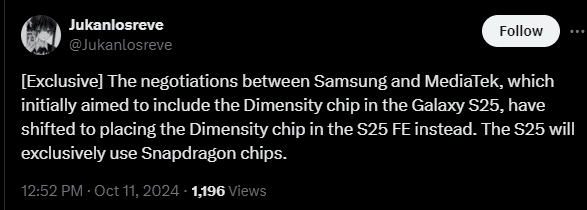A recent report indicates that the Snapdragon 8 Gen 4, also known as Snapdragon X Elite, is expected to cost 25% to 30% more than the previous version. However, Samsung can’t just rely on its own Exynos 2500 chipset to drive its flagship devices without risking a fall in popularity.
Potential Partnership with MediaTek
Earlier claims suggested that Samsung was looking into a partnership with MediaTek to utilize the Dimensity 9400 chipset for the Galaxy S25 and S25+. However, a recent leak from tipster Jukanlosreve indicates that Samsung will reserve the D2400 chip exclusively for the Galaxy S25 FE, while all models in the S25 series will feature the Snapdragon 8 Gen 4 across all regions. Samsung initially launched its first FE device with a Snapdragon chip but switched to its in-house chips starting from the second generation. The latest version, the Galaxy S24 FE, comes with a slightly underclocked variant of the Exynos 2400.
Uncertainty Surrounding Exynos 2500
There is little trustworthy information available regarding the performance and efficiency of the Exynos 2500 chip, but the move towards MediaTek suggests that the Exynos 2500 might not meet the needed standards. While the Exynos 2400 has shown significant advancements, the yield rate of Samsung’s 3nm process node, which the E2500 will utilize, may play a crucial role in this decision.
Enhancements with Dimensity 9400
Nevertheless, you can look forward to a considerable performance increase in the upcoming FE device if it is equipped with the D2400 chip. For those who don’t know, the D2400 delivers 35% faster single-core and 28% faster multi-core performance compared to the already impressive D2300 chip from the previous year. This new chipset also shows remarkable advancements in ray tracing capabilities, ensuring improved graphics quality for games that support it. Plus, it is 40% more power efficient, which should result in better temperature management and a reasonably good battery life for devices using it.
Furthermore, MediaTek’s 8th Generation NPU introduces several industry firsts in generative AI performance and is compatible with Google’s Gemini Nano, which could enhance on-device Galaxy AI functionalities.


Leave a Reply